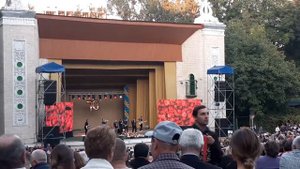
 2:47
2:47
2025-05-21 04:39

 2:34
2:34

 2:34
2:34
2024-04-20 21:34

 5:34
5:34

 5:34
5:34
2025-01-12 10:04

 4:46
4:46

 4:46
4:46
2025-03-18 16:40

 50:57
50:57

 50:57
50:57
2025-09-10 15:14

 4:10
4:10

 4:10
4:10
2024-04-19 19:23

 3:55
3:55

 3:55
3:55
2024-04-12 07:07

 2:14
2:14

 2:14
2:14
2025-09-19 09:50

 2:18
2:18

 2:18
2:18
2025-09-19 12:02

 44:07
44:07

 44:07
44:07
2025-05-04 17:21

 3:28
3:28

 3:28
3:28
2025-09-23 06:03

 4:16
4:16

 4:16
4:16
2023-08-15 16:54

 1:19:14
1:19:14

 1:19:14
1:19:14
2023-11-08 19:50

 56:19
56:19

 56:19
56:19
2023-04-01 21:40

 3:46
3:46

 3:46
3:46
2023-10-02 10:13

 4:06
4:06

 4:06
4:06
2022-12-13 08:06

 3:24
3:24

 3:24
3:24
2022-05-05 06:00
![СВАТЫ. песня «Там где клён шумит.»]() 12:10
12:10
![АКУЛИЧ - Красные глаза (Премьера клипа 2025)]() 2:13
2:13
![Like Nastya – Fly Girl (Official Video 2025)]() 2:01
2:01
![ZAMA - Глаза цвета кофе (Премьера клипа 2025)]() 2:57
2:57
![Маракеш, Сергей Наговицын - До свидания, кореша (Премьера клипа 2025)]() 3:20
3:20
![Рузибек Кодиров - Бинафша (Премьера клипа 2025)]() 3:31
3:31
![Шавкат Зулфикор & Нурзида Исаева - Одамнинг ёмони ёмон буларкан (Премьера клипа 2025)]() 8:21
8:21
![Отабек Муминов - Кетябсан (Премьера клипа 2025)]() 3:17
3:17
![Абрикоса, GOSHU - Удали из памяти (Премьера клипа 2025)]() 4:59
4:59
![Жамоладдин Аматов - Окибат (Премьера клипа 2025)]() 4:38
4:38
![Игорь Балан - Белая зима (Премьера 2025)]() 3:10
3:10
![KhaliF - Я розы тебе принес (Премьера клипа 2025)]() 2:06
2:06
![Алмас Багратиони - Дети света (Премьера клипа 2025)]() 2:52
2:52
![Женя Белоусова - Раненая птица (Премьера клипа 2025)]() 2:47
2:47
![Эльдар Агачев - Путник (Премьера клипа 2025)]() 3:14
3:14
![Бекзод Хаккиев - Нолалар (Премьера клипа 2025)]() 4:07
4:07
![Джамила Икромова - Ошики пушаймонас (Премьера клипа 2025)]() 3:40
3:40
![ARTEE - Ты моя (Премьера клипа 2025)]() 3:31
3:31
![ARTIX - На небе луна (Премьера клипа 2025)]() 2:59
2:59
![Аброр Киличов - Тим-Тим (Премьера клипа 2025)]() 4:42
4:42
![Enrasta - Франция (Премьера клипа 2025)]() 2:44
2:44
![Терминатор 2: Судный день | Terminator 2: Judgment Day (1991) (Гоблин)]() 2:36:13
2:36:13
![Рок-н-рольщик | RocknRolla (2008) (Гоблин)]() 1:54:23
1:54:23
![Однажды в Ирландии | The Guard (2011) (Гоблин)]() 1:32:16
1:32:16
![Дом из динамита | A House of Dynamite (2025)]() 1:55:08
1:55:08
![Вальсируя с Брандо | Waltzing with Brando (2024)]() 1:44:15
1:44:15
![Безжалостная | Stone Cold Fox (2025)]() 1:25:31
1:25:31
![Большое смелое красивое путешествие | A Big Bold Beautiful Journey (2025)]() 1:49:20
1:49:20
![Кровавый четверг | Thursday (1998) (Гоблин)]() 1:27:51
1:27:51
![Бешеные псы | Reservoir Dogs (1991) (Гоблин)]() 1:39:10
1:39:10
![Плохой Cанта 2 | Bad Santa 2 (2016) (Гоблин)]() 1:28:32
1:28:32
![Кей-поп-охотницы на демонов | KPop Demon Hunters (2025)]() 1:39:41
1:39:41
![От заката до рассвета | From Dusk Till Dawn (1995) (Гоблин)]() 1:47:54
1:47:54
![Трон: Арес | Tron: Ares (2025)]() 1:52:27
1:52:27
![Тот самый | Him (2025)]() 1:36:20
1:36:20
![Фантастическая четвёрка: Первые шаги | The Fantastic Four: First Steps (2025)]() 1:54:40
1:54:40
![Свайпнуть | Swiped (2025)]() 1:50:35
1:50:35
![Большой куш / Спи#дили | Snatch (2000) (Гоблин)]() 1:42:50
1:42:50
![Заклятие 4: Последний обряд | The Conjuring: Last Rites (2025)]() 2:15:54
2:15:54
![Свинтусы | The Twits (2025)]() 1:42:50
1:42:50
![Пойман с поличным | Caught Stealing (2025)]() 1:46:45
1:46:45
![Псэмми. Пять детей и волшебство Сезон 1]() 12:17
12:17
![Новогодние мультики – Союзмультфильм]() 7:04
7:04
![МиниФорс]() 0:00
0:00
![Рэй и пожарный патруль Сезон 1]() 13:27
13:27
![Школьный автобус Гордон]() 12:34
12:34
![Котёнок Шмяк]() 11:04
11:04
![Сборники «Умка»]() 1:20:52
1:20:52
![Панда и петушок Лука]() 12:12
12:12
![Истории Баданаму Сезон 1]() 10:02
10:02
![Пип и Альба. Приключения в Соленой Бухте! Сезон 1]() 11:02
11:02
![Панда и Антилопа]() 12:08
12:08
![Минифорс. Сила динозавров]() 12:51
12:51
![Крутиксы]() 11:00
11:00
![Шахерезада. Нерассказанные истории Сезон 1]() 23:53
23:53
![Паровозик Титипо]() 13:42
13:42
![Люк - путешественник во времени]() 1:19:50
1:19:50
![Забавные медвежата]() 13:00
13:00
![Папа Супергерой Сезон 1]() 4:28
4:28
![Команда Дино Сезон 2]() 12:31
12:31
![Сборники «Ну, погоди!»]() 1:10:01
1:10:01
 12:10
12:10
Скачать Видео с Рутуба / RuTube
| 256x144 | ||
| 640x360 |
 2:13
2:13
2025-11-15 12:35
 2:01
2:01
2025-11-10 13:14
 2:57
2:57
2025-11-13 11:03
 3:20
3:20
2025-11-11 00:28
 3:31
3:31
2025-11-15 12:51
 8:21
8:21
2025-11-17 14:27
 3:17
3:17
2025-11-15 12:47
 4:59
4:59
2025-11-15 12:21
 4:38
4:38
2025-11-11 17:38
 3:10
3:10
2025-11-07 14:48
 2:06
2:06
2025-11-11 18:00
 2:52
2:52
2025-11-20 13:43
 2:47
2:47
2025-11-11 17:49
 3:14
3:14
2025-11-12 12:52
 4:07
4:07
2025-11-11 17:31
 3:40
3:40
2025-11-10 14:12
 3:31
3:31
2025-11-14 19:59
 2:59
2:59
2025-11-18 12:12
 4:42
4:42
2025-11-17 14:30
 2:44
2:44
2025-11-20 21:37
0/0
 2:36:13
2:36:13
2025-10-07 09:27
 1:54:23
1:54:23
2025-09-23 22:53
 1:32:16
1:32:16
2025-09-23 22:53
 1:55:08
1:55:08
2025-10-29 16:30
 1:44:15
1:44:15
2025-11-07 20:19
 1:25:31
1:25:31
2025-11-10 21:11
 1:49:20
1:49:20
2025-10-21 22:50
 1:27:51
1:27:51
2025-09-23 22:52
 1:39:10
1:39:10
2025-09-23 22:53
 1:28:32
1:28:32
2025-10-07 09:27
 1:39:41
1:39:41
2025-10-29 16:30
 1:47:54
1:47:54
2025-09-23 22:53
 1:52:27
1:52:27
2025-11-06 18:12
 1:36:20
1:36:20
2025-10-09 20:02
 1:54:40
1:54:40
2025-09-24 11:35
 1:50:35
1:50:35
2025-09-24 10:48
 1:42:50
1:42:50
2025-09-23 22:53
 2:15:54
2:15:54
2025-10-13 19:02
 1:42:50
1:42:50
2025-10-21 16:19
 1:46:45
1:46:45
2025-10-02 20:45
0/0
2021-09-22 22:23
 7:04
7:04
2023-07-25 00:09
 0:00
0:00
2025-11-21 07:32
2021-09-22 23:51
 12:34
12:34
2024-12-02 14:42
 11:04
11:04
2023-05-18 16:41
 1:20:52
1:20:52
2025-09-19 17:54
 12:12
12:12
2024-11-29 14:21
2021-09-22 21:29
2021-09-22 23:36
 12:08
12:08
2025-06-10 14:59
 12:51
12:51
2024-11-27 16:39
 11:00
11:00
2022-07-25 18:59
2021-09-22 23:25
 13:42
13:42
2024-11-28 14:12
 1:19:50
1:19:50
2024-12-17 16:00
 13:00
13:00
2024-12-02 13:15
2021-09-22 21:52
2021-09-22 22:40
 1:10:01
1:10:01
2025-07-25 20:16
0/0

